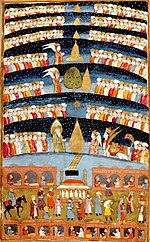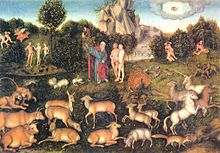Paradise
![]()
This article is about the basic mythological meaning of the term paradise. For derived meanings, see Paradise (disambiguation).
Paradise, according to Jewish and, derived from this, Christian and Islamic concepts, is the place where human beings lived at the beginning of their existence until they were banished from it because of their fall into sin.
Etymologically, the word comes from the ancient Iranian Avestic language; pairi daēza means a fenced area. Cognate is Hebrew pardēs (in later biblical texts for 'arboretum' or 'park' or 'a park of trees surrounded by a rampart'). The alternative name is 'Garden of Eden', Hebrew גן עדן - Gan Eden, Arabic جنة عدن Dschannat Adan, DMG Ǧannat 'Adan or in plural form جنات عدن, DMG Ǧannāt 'Adan 'Gardens of Eden'. A similar conception existed in Greek mythology under the name of Elysion.
Apart from the backward-looking image, there is also a forward-looking image of Paradise, especially in Christianity and Islam, namely as the Kingdom of Heaven into which the God-pleasing will enter after death; cf. Jesus' words to the insightful co-crucified: "Today you will be with me in Paradise". (Luke 23:43 EU). Islam has differentiated this conception more, in it Paradise, Arabic جنة الفردوس, DMG Ǧannat al-Firdaus, is the highest stage of the Kingdom of Heaven altogether called Janna (جنة, literally "garden"). The Garden of Eden also appears in it, but as one of the middle stages.

Seven heavens above the earthly world, Persian miniature of the 11th century, reprint Kashmir 1808

Garden of Eden by Lucas Cranach, 1530, steps of the plot depicted in parallel, three times with God the Father, each robed in red and blue
Search within the encyclopedia